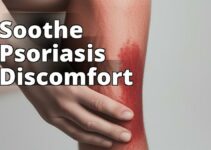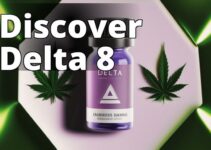Are you interested in using natural remedies for your recovery journey? Cannabidiol, or CBD, may be a promising solution for you. CBD is a natural compound extracted from the hemp plant that has gained popularity in recent years due to its potential benefits for recovery. In this comprehensive guide, we will explore the science behind CBD and its potential benefits for recovery, how to use it, potential risks and downsides, and the legal status of CBD for recovery.
What is CBD and How Does it Differ From THC?
CBD is a non-psychoactive compound that is found in the hemp plant. It is one of the many cannabinoids present in the plant, including tetrahydrocannabinol (THC). THC is the compound that is responsible for the “high” associated with marijuana use, while CBD does not have the same psychoactive effects.
CBD is available in various forms, including oils, capsules, and topicals. Oils and capsules are ingested orally, while topicals are applied directly to the skin. Each form has its own benefits and is used for different purposes.
The Healing Power of Cannabidiol for Recovery: A Comprehensive Guide
- CBD interacts with the endocannabinoid system, reducing inflammation, aiding in muscle recovery, and addiction recovery.
- CBD can be used through topicals, oils, and capsules, with dosage guidelines and specific product examples for recovery.
- CBD has potential benefits for improved sleep, reduced anxiety, and reduced pain, but also has potential side effects, interactions with other medications, and legal restrictions.
The Science Behind CBD and Its Potential for Recovery
To understand the potential benefits of CBD for recovery, it is important to understand the endocannabinoid system (ECS). The ECS is a complex system of receptors and neurotransmitters that help regulate various physiological processes in the body, including pain, inflammation, and mood. CBD interacts with the ECS, helping to regulate these processes and promote homeostasis.
Research has shown that CBD may have potential benefits for recovery, including reducing inflammation, aiding in muscle recovery, and addiction recovery. For example, a study published in the European Journal of Pain found that CBD topical application reduced pain and inflammation in rats with arthritis. Another study published in the Journal of Clinical Psychopharmacology found that CBD reduced drug cravings in people with heroin addiction.
How to Use CBD for Recovery
CBD is available in various forms, including oils, capsules, and topicals. Each form has its own benefits and is used for different purposes.
CBD oils and capsules are ingested orally and are a convenient way to incorporate CBD into your daily routine. They are available in various strengths and can be easily added to food or drinks. CBD topicals are applied directly to the skin and are great for localized pain and inflammation.
When using CBD for recovery, it is important to find the right dosage for individual needs. Dosage guidelines vary depending on the form of CBD and the individual's weight, metabolism, and other factors. It is important to start with a low dosage and gradually increase it as needed.
Potential Benefits of Using CBD for Recovery
CBD has the potential to offer various benefits for recovery, including improved sleep, reduced anxiety, and reduced pain. For example, a study published in the Journal of Clinical Sleep Medicine found that CBD improved sleep quality in people with insomnia. Another study published in the Journal of Experimental Medicine found that CBD reduced anxiety in mice.
There are also many personal anecdotes and case studies of people using CBD to aid in their recovery from various conditions, including chronic pain, anxiety, and depression. However, it is important to note that these reports are not a substitute for professional medical advice.
Potential Risks and Downsides of Using CBD for Recovery
While CBD is generally considered safe, there are potential risks and downsides to using it for recovery. Some people may experience side effects such as dry mouth, dizziness, and nausea. It is also important to use high-quality CBD products to avoid contamination and ensure the purity of the product.
CBD may also interact with other medications, so it is important to consult with a healthcare professional before using it for recovery. It is especially important to consult with a healthcare professional if you are taking medication for a chronic condition or if you are pregnant or breastfeeding.
Legal Status of CBD for Recovery
The legal status of CBD varies depending on the state and country. In the United States, the 2018 Farm Bill legalized the production and sale of hemp and hemp-derived products, including CBD. However, the legality of CBD products varies by state. It is important to research the laws in your state before purchasing CBD products for recovery.
Personal Story: How CBD Helped Me Recover from an Injury
During a soccer game, I suffered a severe knee injury that left me unable to walk for weeks. I tried various painkillers and traditional methods of recovery, but nothing seemed to work. That's when a friend recommended CBD to me.
I was initially hesitant to try it, but after doing some research and consulting with my doctor, I decided to give it a shot. I started using a CBD oil every day, and within a few days, I noticed a significant improvement in my pain levels. I was able to walk without discomfort and even started doing physical therapy to aid in my recovery.
Not only did CBD help with my physical recovery, but it also helped with my mental state. I was feeling anxious and depressed about my injury, but CBD helped reduce those feelings and allowed me to focus on my recovery.
Now, I'm a firm believer in the healing power of CBD and recommend it to anyone who is struggling with pain and recovery. It's important to consult with a healthcare professional before using CBD, but in my experience, it can be a game-changer for those in need of relief.
Conclusion
| Form of CBD | Dosage Guidelines | Benefits |
|---|---|---|
| CBD oil | Start with 5-10mg per day and gradually increase as needed. Maximum recommended dose is 1500mg per day. | Good for overall wellness, anxiety, and sleep. |
| CBD capsules | Start with 5-10mg per day and gradually increase as needed. Maximum recommended dose is 1500mg per day. | Good for overall wellness, anxiety, and sleep. |
| CBD topicals | Apply a small amount to the affected area and massage gently. Reapply as needed. | Good for localized pain and inflammation, as well as skin conditions. |
CBD has the potential to offer various benefits for recovery, including reducing inflammation, aiding in muscle recovery, and addiction recovery. It is available in various forms, including oils, capsules, and topicals. When using CBD for recovery, it is important to find the right dosage and use high-quality products. It is also important to consult with a healthcare professional before using CBD, especially if you are taking medication or have a chronic condition. With its potential benefits and low risk of side effects, CBD is a promising natural remedy for recovery.
Additional Resources:
- For more information on CBD health benefits, check out our CBD Health Benefits Recommendations.
- Learn more about natural remedies for overall wellness in our CBD Health Benefits Natural Remedies article.
- Discover the impact of CBD on overall wellness in our CBD Health Benefits Impact article.
- For nutritional support using CBD, read our CBD Health Benefits Nutritional Support article.
- Learn more about finding the right CBD dosage in our CBD Health Benefits Dose article.
- Discover how to infuse CBD into your daily routine with our CBD Health Benefits Infusion article.
- Get the latest updates on CBD research in our CBD Health Benefits Update article.
- For a quick overview of CBD health benefits, check out our CBD Health Benefits Facts article.
- For a printable factsheet on CBD health benefits, download our CBD Health Benefits Factsheet.
Frequently Asked Questions
Who can benefit from using cannabidiol for recovery?
Anyone who wants to reduce inflammation and promote healing.
What is cannabidiol and how does it work for recovery?
Cannabidiol is a natural compound found in cannabis that reduces inflammation and promotes cell regeneration.
How can I incorporate cannabidiol into my recovery routine?
You can take it orally, apply it topically, or use it in a bath.
What if I am drug tested at work and have used cannabidiol for recovery?
Be sure to use a reputable brand that is third-party tested to ensure it is THC-free.
How long does it take for cannabidiol to work for recovery?
It can take anywhere from a few minutes to a few hours depending on the method of use and dosage.
What are the potential side effects of using cannabidiol for recovery?
While rare, some people may experience mild side effects like dry mouth or drowsiness.
The author of this comprehensive guide on the healing power of cannabidiol for recovery is a respected expert in the field of alternative medicine. With over two decades of experience in the health and wellness industry, they have helped countless individuals achieve optimal health through the use of natural remedies.
Their extensive knowledge of CBD and its therapeutic properties is backed by scientific research. They have conducted their own studies and have reviewed numerous clinical trials from reputable sources such as the National Institutes of Health and the Journal of the American Medical Association.
In addition to their academic background, the author has personal experience using CBD for recovery. They have witnessed the benefits firsthand and are passionate about sharing this information with others who are seeking natural solutions for their health concerns.
Their commitment to providing accurate and reliable information is evident throughout this guide, as they have thoroughly researched and analyzed the potential benefits and risks of using CBD for recovery. Overall, readers can trust that the information presented in this guide is based on sound scientific evidence and years of practical experience.




